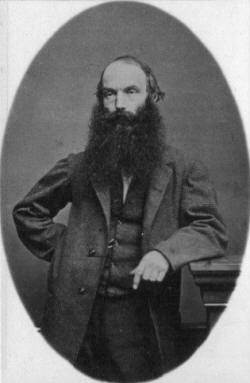

Queer Places:
University of Cambridge, 4 Mill Ln, Cambridge CB2 1RZ
Christ Church Churchyard
Esher, Elmbridge Borough, Surrey, England
 Dunbar Isidore Heath (3 March 1816, in London – 27 May 1888) was an English clergyman prosecuted for heresy in 1861; he was
part of the Cambridge Apostles.
Dunbar Isidore Heath (3 March 1816, in London – 27 May 1888) was an English clergyman prosecuted for heresy in 1861; he was
part of the Cambridge Apostles.
Dunbar lsidore, 3rd son of George Heath (1779-1852) and Ann Raymond Dunbar (1787-1842), was born March 3rd, 1816, and named after M. Isidore, a French friend of his father. Being of a peculiarly shy and nervous, disposition, he was unable to face the trials of life at Westminster School, and leaving after a short stay there, completed his early studies for the most part at home. Proceeding to Trinity College, Cambridge, in 1834, he was elected Scholar in 1836, graduated in 1838 as 5th Wrangler, and obtained a Fellowship in 1840. He was ordained Deacon in 1842 and Priest in 1843. He held the curacies of Denham, Bucks., and Uxbridge Moor, Middlesex, where he won the esteem of many, alike by his public ministrations and his private character.
In 1846 he accepted the College living of Brading, Isle of Wight. Here one of his first acts was to erect, almost at his own expense, a new Vicarage; the old one being so unwholesome as to have earned the title of Kill Parson House. He married Feb. 22nd, 1848, Emily Mary Harrison, of Hill House, Brading, and had issue two sons, Douglas Leopold and James Dunbar. His ministerial labours at Brading were active and zealous according to the standard, of the day, and his many acts of personal charity and kindliness greatly endeared him to his people.
He was a recognised authority on Egyptology, being one of the first English scholars to decipher the Papyri in the British Museum, and his services as a pioneer in this branch, of learning are fully acknowledged in the Speaker's Commentary, Vol. I, pt. 1, p. 468. His chief works in this department were " The Exodus Papyri," 1855, and " The Proverbs of Aphobis, a record of the patriarchal age," 1858. His account of the " Scottish .and Italian Missions to the Anglo-Saxons " (1845), is quoted as an authority by Bp. Chr. Wordsworth in " Theophilus Anglicanus."
In 1852 his views became more rationalistic, and were embodied in his book " The future Human Kingdom of Christ," followed by a long series of tracts, and " Sermons on important subjects," 1859. The opinions thus set forth did not controvert any fundamental dogmas of the Christian faith, but were sufficiently advanced to alarm the ecclesiastical authorities of the day; and in 1861, the author was prosecuted for heresy by the Bishop of Winchester, and sentenced by the Court of Arches to deprivation of his benefice. He defended himself by several controversial pamphlets, and his book " Defence of my professional character," 1862, etc. An appeal was also carried to the Privy Council, but this failed, and the judgment was finally confirmed June 6th, 1862.
On leaving Brading, he resided for many years at Dunbar House, Esher, and by joining several Iearned societies, Biblical Archaeological, Anthropological, Palestine Exploration, etc, found an outlet for his literary energies in the journals and reports which year by year ware published. In 1873 he brought out Phoenician Inscriptions, pt. I., for which a special type was cast and the records and language of the Hittites also received his attention,
In 1816, as a result of heavy financial losses, he moved into Rochester house in Esher, where after a protracted illness, he died May 27th, 1888, and was buried in Esher church yard.
My published books: